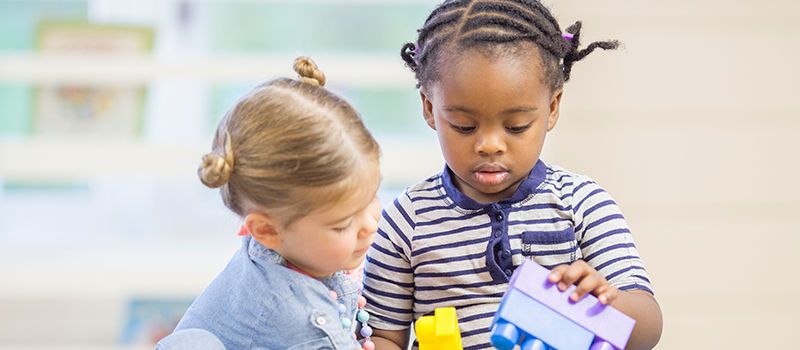
The Child Development Centers offer a play based curriculum that supports children’s cognitive, social-emotional, and physical development. The children enjoy age appropriate learning activities and projects that support their developing ideas and interests. Activities include creative arts and music, dramatic play, blocks, games, early literacy, sand and water play, math and science explorations, and large motor play, such as climbing and tricycle riding.
Children enjoy a nutritious breakfast, lunch, and afternoon snack each day. Meals are cooked on site and served family style with teachers joining children at the table for conversation and community building. The program offers parent education and partners with a variety of community-based agencies, such as the Early Childhood Mental Health Program, Parent Services Project, and Raising-A- Reader, whose services support family success and children’s healthy development.
A Demonstration Preschool
The College of Marin Child Development Program is a demonstration preschool for students who are taking practicum courses in Early Childhood Education, Pediatric Nursing, Child Psychology, Behavioral Science, and other disciplines. As a demonstration preschool, our goal is to model the following best practices:
An early childhood curriculum that is:
Play-based
Young children develop concepts, skills, and knowledge about the world through playful explorations of the learning environment and through playful interactions with their peers. Children’s self-initiated play and discovery learning inform the curriculum, which is organized to encourage children’s play.
Relationship-based
Warm and respectful relationships among teachers, parents, and children support children’s learning and wellbeing. Teachers encourage children’s prosocial behaviors through positive guidance, which helps children develop their own internal controls, problem-solving skills, and a positive sense of self.
Emergent
Teachers organize environments and experiences that support and incorporate children’s emerging ideas and interests.
Integrated
Activities in all interest areas support children’s learning in a variety of subject matter domains (e.g., children learn the language, early literacy, math concepts, and social reciprocity in the dramatic play area).
Project-based
Children’s studies are sustained and involve in-depth investigations.
Unified
Curriculum development is a team effort - all teachers contribute and collaborate.
Documented
Children’s learning, not just their activities, is documented.
Teaching practice that is:
- Reflective
“Teachers critically assess their own teaching experiences to guide and inform practice” (ECE 280 SLO 6) - Intentional
Teachers meet regularly to share their observations of children and to plan group and individual experiences that support learning in all domains. - Articulate
Teachers describe how their knowledge of child development informs their practice so that adult student learners understand how teachers reflect on, assess, and modify their practice.
Teachers work as a collaborative team to design, implement, and evaluate their curriculum based on:
- Appropriate developmental expectations of the children
- Child observation and assessment that is authentic (experiences that occur naturally/no tests)
